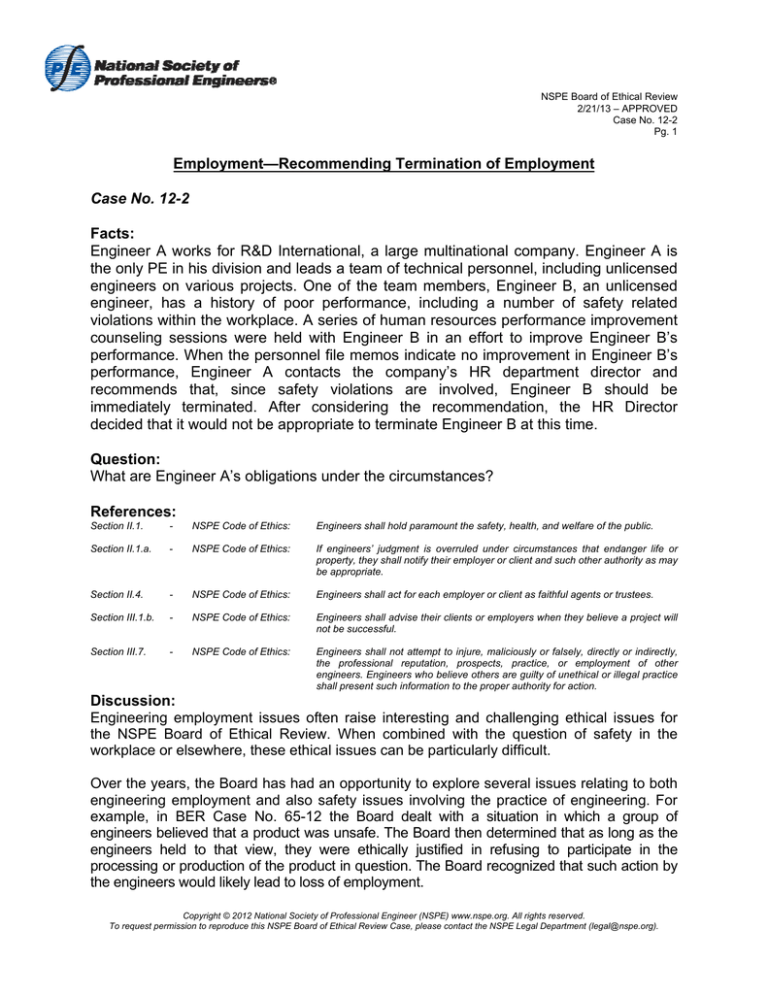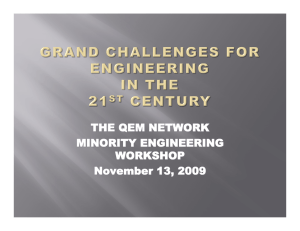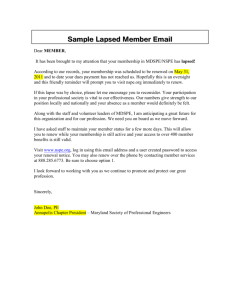
NSPE Board of Ethical Review
2/21/13 – APPROVED
Case No. 12-2
Pg. 1
Employment—Recommending Termination of Employment
Case No. 12-2
Facts:
Engineer A works for R&D International, a large multinational company. Engineer A is
the only PE in his division and leads a team of technical personnel, including unlicensed
engineers on various projects. One of the team members, Engineer B, an unlicensed
engineer, has a history of poor performance, including a number of safety related
violations within the workplace. A series of human resources performance improvement
counseling sessions were held with Engineer B in an effort to improve Engineer B’s
performance. When the personnel file memos indicate no improvement in Engineer B’s
performance, Engineer A contacts the company’s HR department director and
recommends that, since safety violations are involved, Engineer B should be
immediately terminated. After considering the recommendation, the HR Director
decided that it would not be appropriate to terminate Engineer B at this time.
Question:
What are Engineer A’s obligations under the circumstances?
References:
Section II.1.
-
NSPE Code of Ethics:
Engineers shall hold paramount the safety, health, and welfare of the public.
Section II.1.a.
-
NSPE Code of Ethics:
If engineers’ judgment is overruled under circumstances that endanger life or
property, they shall notify their employer or client and such other authority as may
be appropriate.
Section II.4.
-
NSPE Code of Ethics:
Engineers shall act for each employer or client as faithful agents or trustees.
Section III.1.b.
-
NSPE Code of Ethics:
Engineers shall advise their clients or employers when they believe a project will
not be successful.
Section III.7.
-
NSPE Code of Ethics:
Engineers shall not attempt to injure, maliciously or falsely, directly or indirectly,
the professional reputation, prospects, practice, or employment of other
engineers. Engineers who believe others are guilty of unethical or illegal practice
shall present such information to the proper authority for action.
Discussion:
Engineering employment issues often raise interesting and challenging ethical issues for
the NSPE Board of Ethical Review. When combined with the question of safety in the
workplace or elsewhere, these ethical issues can be particularly difficult.
Over the years, the Board has had an opportunity to explore several issues relating to both
engineering employment and also safety issues involving the practice of engineering. For
example, in BER Case No. 65-12 the Board dealt with a situation in which a group of
engineers believed that a product was unsafe. The Board then determined that as long as the
engineers held to that view, they were ethically justified in refusing to participate in the
processing or production of the product in question. The Board recognized that such action by
the engineers would likely lead to loss of employment.
Copyright © 2012 National Society of Professional Engineer (NSPE) www.nspe.org. All rights reserved.
To request permission to reproduce this NSPE Board of Ethical Review Case, please contact the NSPE Legal Department (legal@nspe.org).
NSPE Board of Ethical Review
2/21/13 – APPROVED
Case No. 12-2
Pg. 2
In BER Case No. 82-5, where an engineer employed by a large defense industry firm
documented and reported to his employer excessive costs and time delays by
subcontractors, the Board ruled that the engineer did not have an ethical obligation to
continue his efforts to secure a change in the policy after his employer rejected his reports,
or to report his concerns to the proper authority, but has an ethical right to do so as a
matter of personal conscience. The Board noted that the case did not involve a danger to
the public health or safety, but related to a claim of unsatisfactory plans and the unjustified
expenditure of public funds. The Board indicated that it could dismiss the case on the
narrow ground that the NSPE Code does not apply to a claim not involving public health
and safety, but that was too narrow a reading of the ethical duties of engineers engaged in
such activities. The Board also stated that if an engineer feels strongly that an employer's
course of conduct is improper when related to public concerns, and if the engineer feels
compelled to blow the whistle to expose facts as he sees them, he may well have to pay
the price of loss of employment. In this type of situation, the Board felt that the ethical duty
of the engineer becomes a matter of personal conscience. However, the Board was
unwilling to make a blanket statement that there is an ethical duty in these kinds of
situations for the engineer to continue the campaign within the company, and make the
issue one for public discussion.
In BER Case 88-6, an engineer was employed as the city engineer/director of public works
with responsibility for disposal plants and beds and reported to a city administrator. After
(1) observing that the discharge exceeds allowable limits and is in violation of standards
which are required to be reported to the state water pollution control authorities, (2)
discussing the problem privately with members of the city council, (3) being warned by the
city administrator to only report the problem to him, (4) discussing the problem again
informally with the city council, and (5) being relieved by the city administrator of
responsibility for the disposal plants and beds and replaced by a technician, the engineer
continued to work in the capacity as city engineer/director of public works. In ruling that the
engineer failed to fulfill her ethical obligations by informing the city administrator and certain
members of the city council of her concern, the Board found that the engineer was aware
of a pattern of ongoing disregard for the law by her immediate supervisor as well as by
members of the city council. After several attempts to modify the views of her superiors, the
engineer knew or should have known that "proper authorities" were not the city officials, but
more probably state officials. The Board could not find it credible that a city
engineer/director of public works for a medium-sized town would not be aware of this basic
obligation. Said the Board, the engineer's inaction permitted a serious violation of the law to
continue and made the engineer an "accessory" to the actions of the city administrator and
others.
Copyright © 2012 National Society of Professional Engineer (NSPE) www.nspe.org. All rights reserved.
To request permission to reproduce this NSPE Board of Ethical Review Case, please contact the NSPE Legal Department (legal@nspe.org).
NSPE Board of Ethical Review
2/21/13 – APPROVED
Case No. 12-2
Pg. 3
In BER Case 92-4, Engineer A, an environmental engineer employed by the state
environmental protection division, was ordered to draw up a construction permit for
construction of a power plant at a manufacturing facility. He was told by a superior to move
expeditiously on the permit and "avoid any hang-ups" with respect to technical issues.
Engineer A believed the plans as drafted were inadequate to meet the regulation
requirements and that outside scrubbers to reduce sulphur dioxide emissions were
necessary; without them, the issuance of the permit would violate certain air pollution
standards as mandated under the 1990 Clear Air Act. His superior believed the plans,
which involved limestone mixed with coal in a fluidized boiler process would remove 90%
of the sulphur dioxide, would meet the regulatory requirements. Engineer A contacted the
state engineering registration board and was informed, based upon the limited information
provided to the board, that suspension or revocation of his engineering license was a
possibility if he prepared a permit that violated environmental regulations. Engineer A
refused to issue the permit and submitted his findings to his superior. The department
authorized the issuance of the permit. The case received widespread publicity in the news
media and was investigated by state authorities. The Board determined that the situation
did not involve a matter of personal conscience, but rather a matter which had a direct
impact upon the public health and safety. Yet unlike the circumstances involved in BER
Case 88-6 where the issues were hidden from public, here, the case involves facts which
have received coverage in the media. In view of that fact, the Board did not believe it was
incumbent upon Engineer A to bring this issue to the attention of the "proper authorities".
According to the Board, such officials were already aware of the situation and had begun
an investigation. However, the Board believed it would not have been ethical for Engineer
A to withdraw from further work on the project because Engineer A had an obligation to
stand by his position consistent with his obligation to protect the public health, safety, and
welfare and refuse to issue the permit. The Board indicated that engineers have an
essential role as technically qualified professionals to "stick to their guns" and represent the
public interest under the circumstances where they believe the public health and safety is
at stake.
Turning to the facts in the present case, it is the NSPE Board of Ethical Review’s opinion
that while it is important to be mindful of a variety of factors that must be weighed in
connection with the decision to retain or terminate an employee in the workplace, when
observable issues of safety are involved, it is essential for professional engineers to make
their views known and heard. Clearly the decision to terminate any employee for cause is a
complicated one and dependent upon a variety of factors and considerations. Under the
present facts, following a series of employment evaluations revealing a number of related
safety violations, Engineer A made a recommendation to the Human Resources
Department which was not accepted. If Engineer A believes that the continued
employment of Engineer B will endanger other employees of R&D International or other
parties, Engineer A has an obligation to bring this matter to the attention of a higher level of
company management. The NSPE Code of Ethics for Engineers compels the engineer to
safeguard the health, safety, and welfare of the public. The Board also felt that, while
Copyright © 2012 National Society of Professional Engineer (NSPE) www.nspe.org. All rights reserved.
To request permission to reproduce this NSPE Board of Ethical Review Case, please contact the NSPE Legal Department (legal@nspe.org).
NSPE Board of Ethical Review
2/21/13 – APPROVED
Case No. 12-2
Pg. 4
Engineer B is still in the employ of R&D International, Engineer A should do all in his power
to eliminate the safety-related issues. While this is not a clear case where Engineer A’s
judgment is being overruled, Engineer A would not be fulfilling his ethical obligation to R&D
International if Engineer A did not take all necessary and appropriate steps to communicate
his concerns regarding the performance of Engineer B. Engineer A’s actions do not in any
way constitute an effort to injure maliciously or falsely, directly or indirectly, the professional
reputation, prospects, or employment of Engineer B. Instead, Engineer A’s reporting of
malfeasance is an honest and candid measure to ensure Engineer A’s adherence to the
NSPE Code.
Conclusion:
Since observable issues of safety are involved, Engineer A has an obligation to make his
professional opinion and recommendation known to higher management. The Board also
felt that, while Engineer B is still in the employ of R&D International, Engineer A should do
all in his power to eliminate the safety-related issues.
Board of Ethical Review:
Curtis A. Beck, P.E., F.NSPE
Mark H. Dubbin, P.E., NSPE (Vice Chair)
Luke Patterson, P.E.
Monte L. Phillips, Ph.D., P.E., F.NSPE
Mumtaz A. Usmen, Ph.D., P.E., F.NSPE
Samuel G. Sudler III, P.E., NSPE (Chair)
NOTE: The NSPE Board of Ethical Review considers ethical cases involving either real or hypothetical matters submitted to it from
NSPE members, other engineers, public officials, and members of the public. The BER reviews each case in the context of the
NSPE Code and earlier BER opinions. The facts contained in each case do not necessarily represent all of the pertinent facts
submitted to or reviewed by the BER.
Each opinion is intended as guidance to individual practicing engineers, students, and the public. In regard to the question of
application of the NSPE Code to engineering organizations (e.g., corporations, partnerships, sole proprietorships, government
agencies, and university engineering departments), the specific business form or type should not negate nor detract from the
conformance of individuals to the NSPE Code. The NSPE Code deals with professional services, which must be performed by real
persons. Real persons in turn establish and implement policies within business structures.
This opinion is for educational purposes only. It may be reprinted without further permission, provided that this statement is included
before or after the text of the case and appropriate attribution is provided to the National Society of Professional Engineers’ Board of
Ethical Review.
To obtain additional NSPE opinions, visit www.nspe.org or call 800-417-0348.
Copyright © 2012 National Society of Professional Engineer (NSPE) www.nspe.org. All rights reserved.
To request permission to reproduce this NSPE Board of Ethical Review Case, please contact the NSPE Legal Department (legal@nspe.org).




